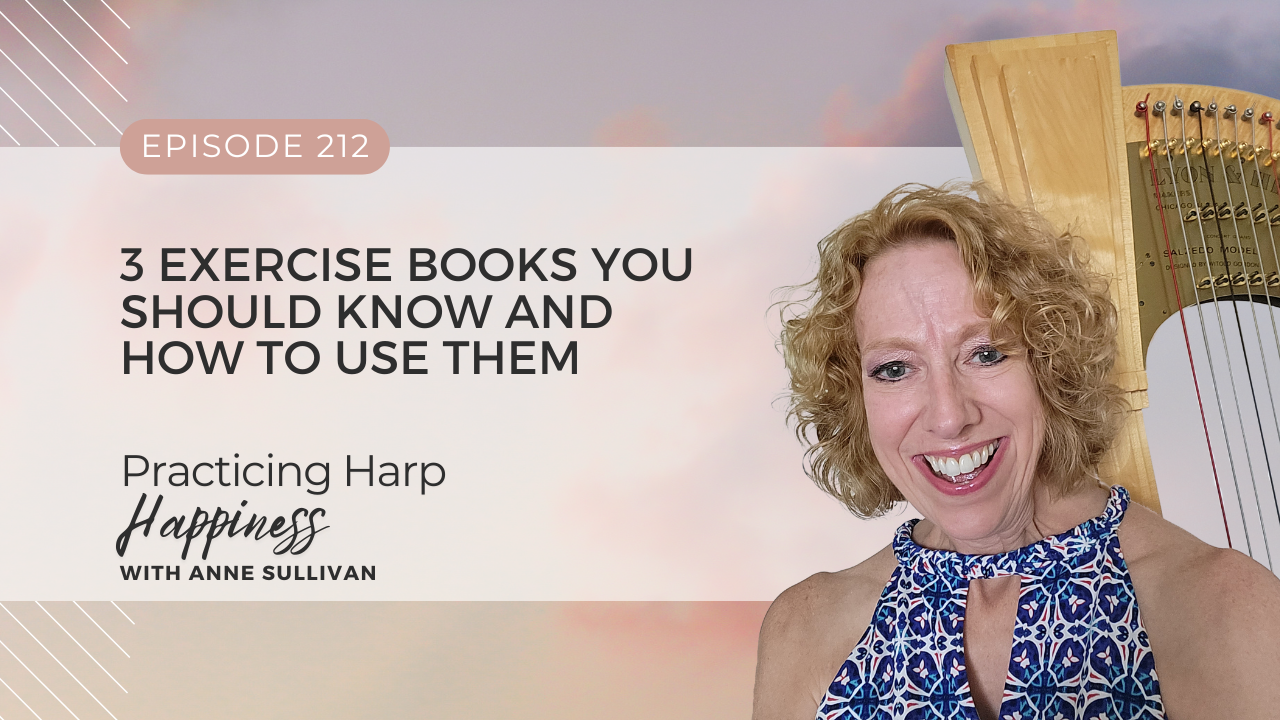Practicing Harp Happiness
#219: Back to the Harp - Without Killing the Vacation Vibe

I know I’m dating myself, but here goes…
Back in the 1960’s there was a television show called “Sea Hunt.” The show centered around a free-lance scuba diver named Mike Nelson, played by Lloyd Bridges. Mike Nelson was a former Navy diver and a member of the Coast Guard Auxiliary. As a free-lance diver, he was hired for all kinds of dangerous underwater work, everything from salvaging precious cargo from wrecked ships to rescuing people trapped in caves. Each episode had dangerous situations and villains who were ready to slash the hoses on Mike’s air tanks.
In nearly every episode, Mike would have to make a hasty ascent from the depths, which he would attempt to time carefully to avoid “the bends,” a potentially fatal condition more formally called decompression sickness. On occasion. Mike would have to spend time in a decompression chamber.
Watching this as a child, I was fascinated by the danger of too hasty a return to the surface. On the one hand, Mike would be running out ...
#218: What Makes Any Piece a “Harp Piece”?
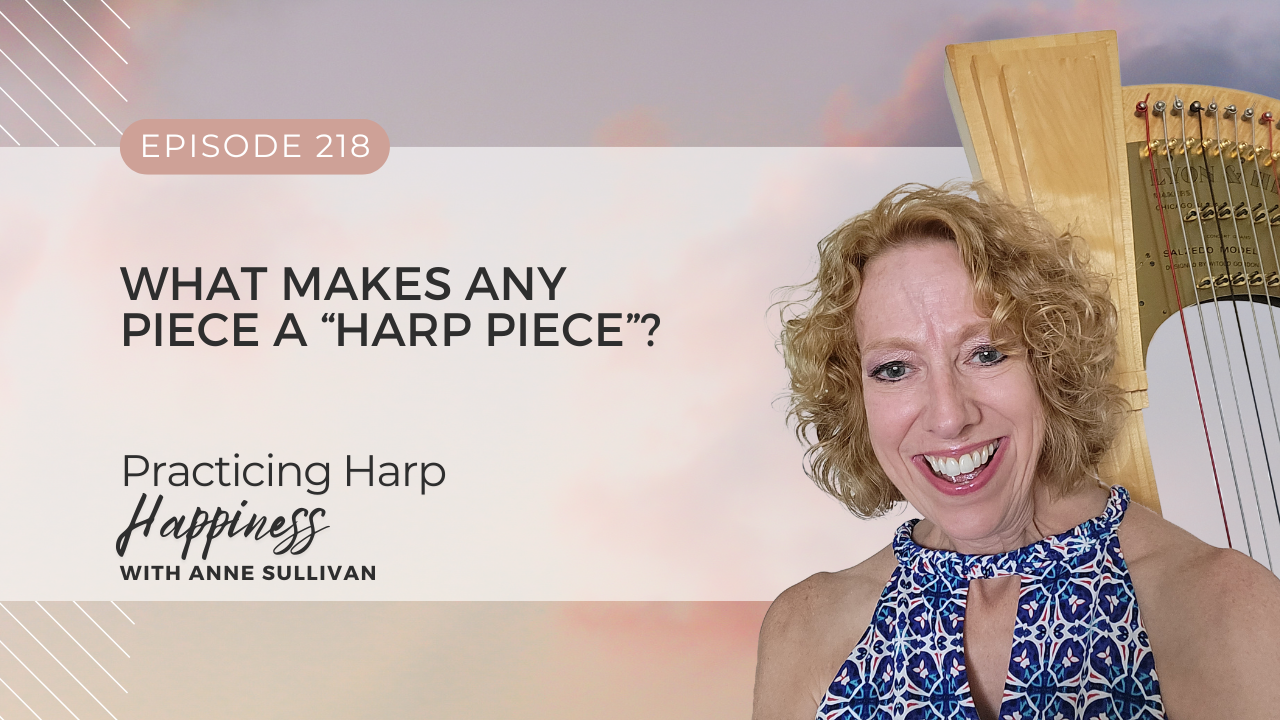
Here’s our question for today: what makes a piece of music a “harp piece”?
Does it have to have been originally written for harp? Or composed by a harpist? Or could any piece of music, no matter what instrument or instruments it was written for, be a harp piece if you play it on the harp?
I happen to think that the third answer is the correct one. Mostly. Let me explain.
If you play a piece on the harp, it has absolutely become a harp piece whether it started out that way or not. But that doesn’t necessarily mean that it should have become a harp piece. Some pieces just don’t work on the harp. Take the “1812 Overture,” for example. This piece was written by Tchaikovsky to commemorate Russia’s victory over Napoleon. It’s 15 minutes long, It requires a full symphony orchestra (minus a harp), an additional brass band, a bell carillon and a battery of cannons - yes, cannons. How could a single harp play a meaningful rendition of this monster work? You could play some of the themes f...
#217: The Secret to Dexterity: Crosstrain Your Hands
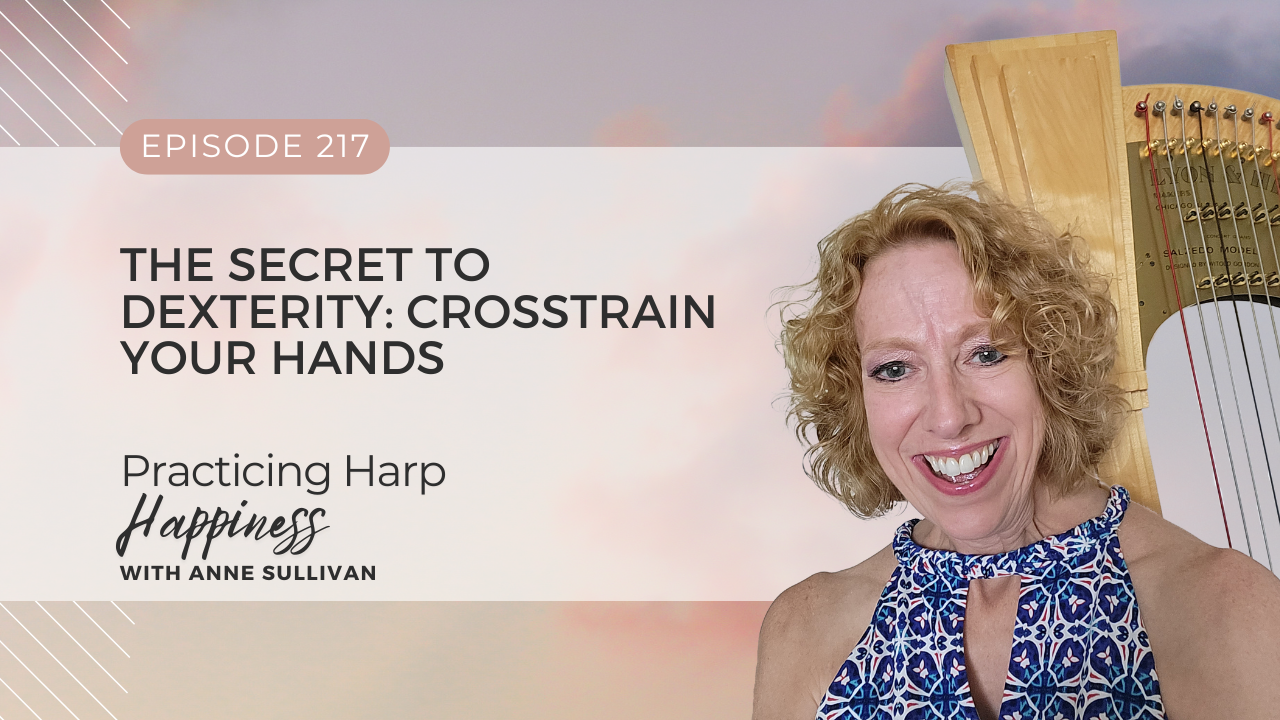
Happy Bastille Day! This isn’t a French themed podcast episode, and we won’t be breaking the bars on any prisons today. However, while the French national motto of liberté, égalité, fraternité is sounding across the globe, we should give some thought to the unequal treatment we give our hands. I mean the difference in the demands we place on our right and left hands.
Probably you’ve thought about the very different roles that our hands play musically. Most often, the right hand plays a melody and the left hand plays an accompaniment. But think about it in a practical, action-related way for a moment. If our right hand specializes in melodies, then it likely is accustomed to connected, legato playing, along with some chords and arpeggios.
Our left hand, though, because it serves to support the melody, is more used to jumping between low bass notes and chords above them, or playing a series of octaves, or playing continuous arpeggiated accompaniments. That is a very different skil...
#216: Celebrating of Summer - 20+ Pieces Just For Fun
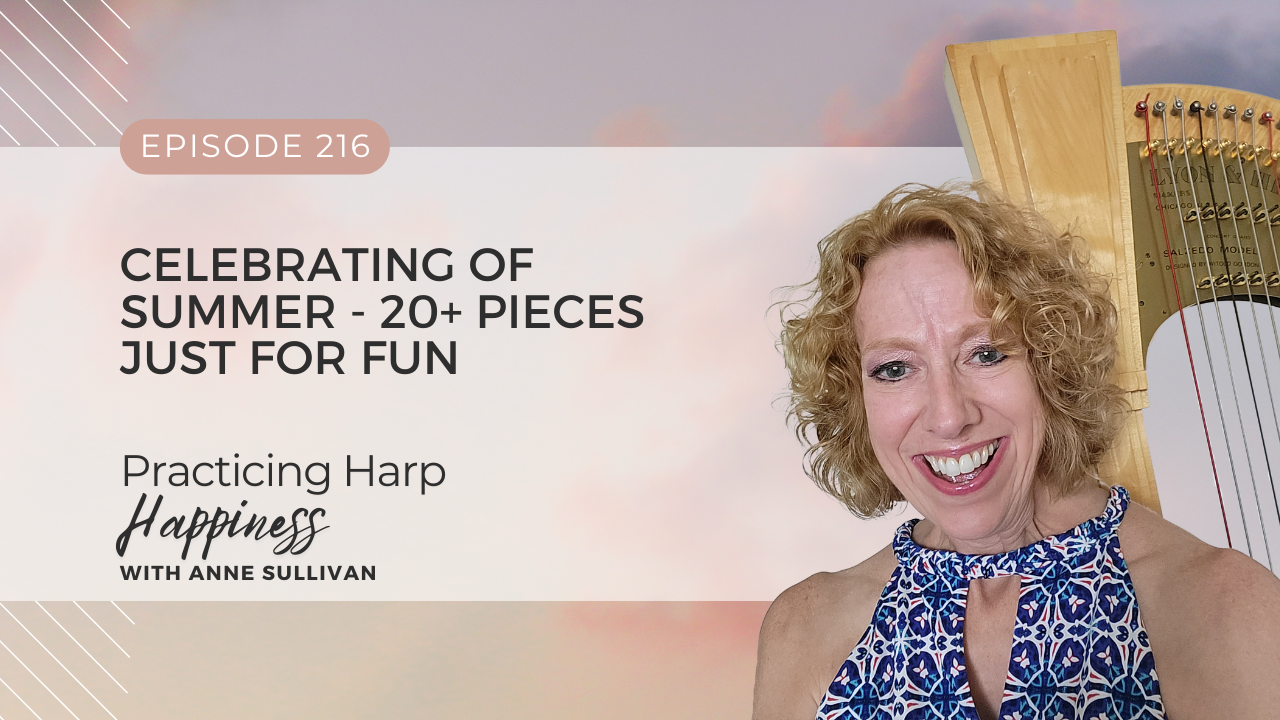
This week I started my yearly ritual of going through my drawers of music and pulling out new pieces to play. Actually they aren’t all new; some are old friends that I haven’t played in years. Others are pieces that have been sitting around waiting for me to get to them. Others are favorites that I seem to pull out every summer and play for a while.
It’s a summer thing for me. Perhaps because my playing schedule is a little lighter, I don’t feel as pressured or as driven. Also, though, I just want to play music, music that fits my vacation mindset.
So this week as I was looking through the stacks, I thought maybe I could give you some ideas of pieces that might fit your summertime mood. Or if it’s not summer weather for you right now, maybe these pieces will add some sunshine to your harp playing.
Some of these are classics from the harp repertoire or classic transcriptions for harp. Others are newer compositions you may not know. I’ve thrown in a couple popular music selectio...
#215: The Superpower of Shortcuts and Why You Need Them Now
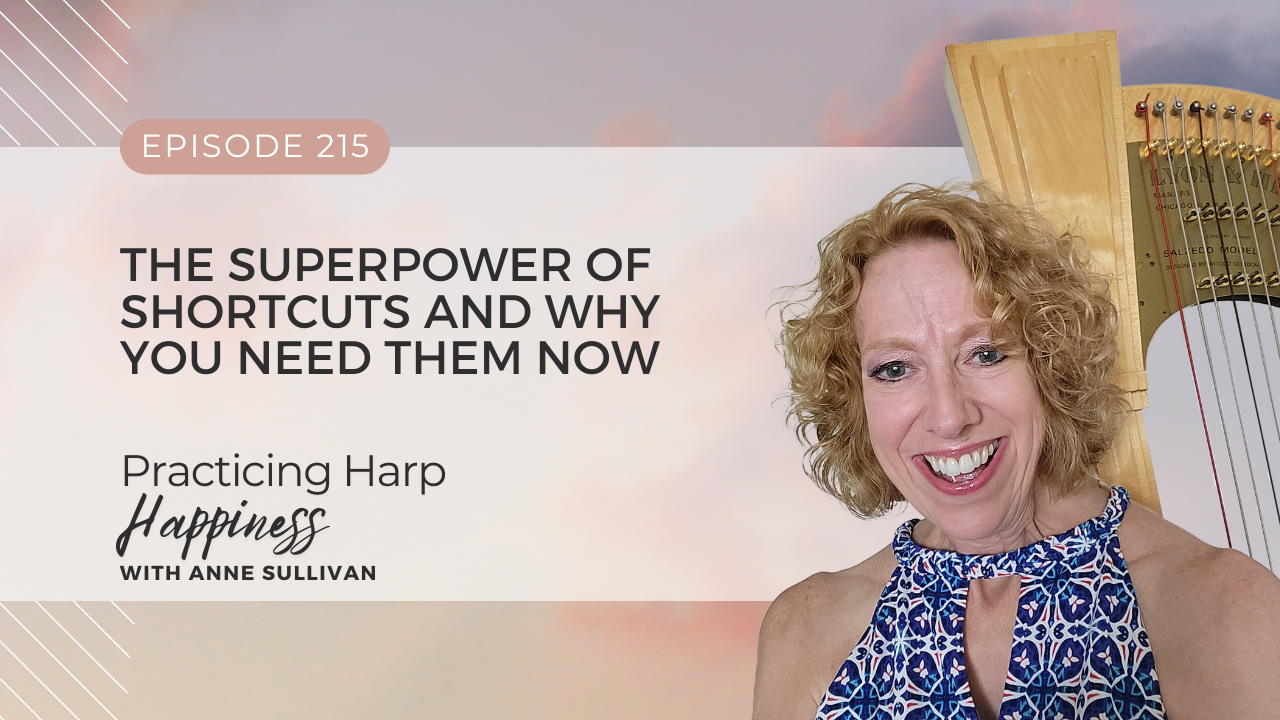
There’s a third kind of shortcut, though, that I want us to think about today. It’s the kind of shortcut that comes with experience. I remember when I was learning to sew and following all the directions very carefully so that I wouldn’t mess up. I even learned which pattern companies had the clearest directions, and which seemed to presume that I knew more than I did, so there were steps missing. Those missing steps weren’t shortcuts, per se; they were just knowledge that a more experienced sewer would have.
One day, I watched a professional seamstress start to cut out a dress. She was making a concert dress for me, and I was excited to watch her start on it while I could watch. What turned out to be an even bigger thrill was to see that instead of painstakingly pinning the pattern onto the cloth, the way I learned in Home Ec class, she just laid a few weights on the pattern to hold it lightly in place and cut around it. What a shortcut and a timesaver! And why had I never though...
#214: Recovering from Burnout - the 5R Framework to Recover and Reset
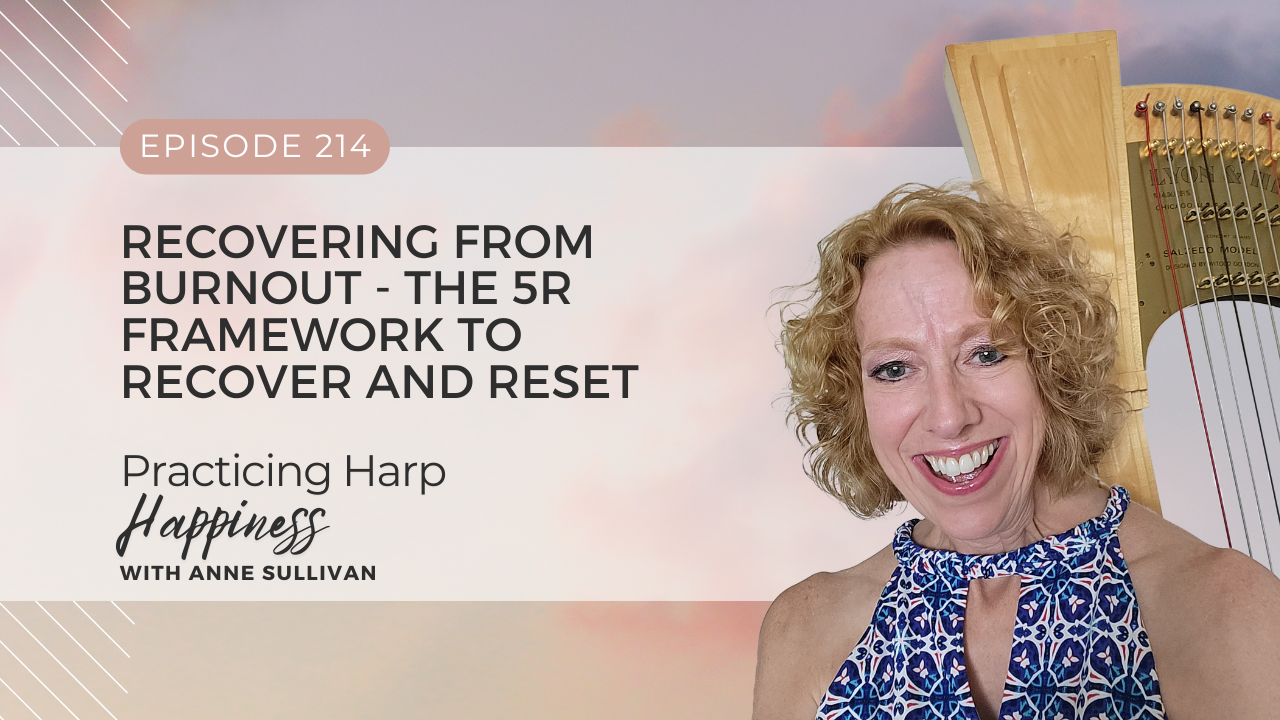
It’s summer time here and time for a little R and R, rest and relaxation, maybe even time away. You might be feeling like you need some time away from whatever stress you’ve been experiencing. I hope it isn’t your harp playing that’s been causing the stress, but even playing and practicing the harp can cause frustration and burnout. If you’re feeling like you need a break from your harp playing, I’m here to help and to make sure you take that break in a way that will bring you more confidence and more joy in your harp playing again.
Actually, at the time you are listening to this, I am on vacation with my husband. We are in Bermuda, which is one of our favorite places to vacation. We went there for our honeymoon and loved it so much that we planned to go back every five years. We’ve missed a couple of those five year milestones; COVID was one of the reasons, of course. But this year, we’re going back and I can’t wait.
Often people will ask me if I take a harp when I’m on vacation,...
#213: Freedom to Choose - How to Make Any Piece Sound Right
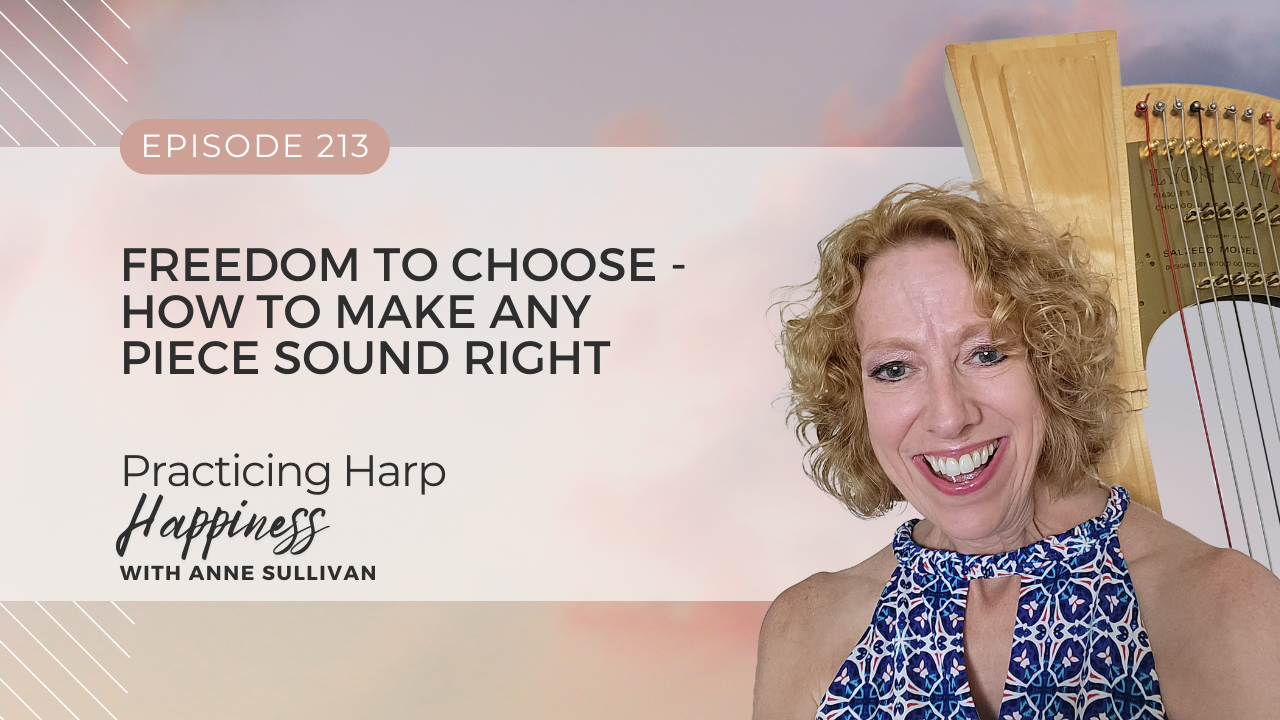
Have you ever made something and it turned out ok, but somehow it just didn’t look right? Maybe you thought those two paint colors would go together, but now you’re not sure. Or maybe the furniture arrangement in the living room looked great on paper but it sort of doesn’t work now that you see everything in place.
I think we’ve all had those moments. I had one not long ago with a photo I was doing. It wasn’t quite right, but since I had to get it done, all I could do was to shrug and sign off on it, whether it was right or not. But if a piece of music we’re working on doesn’t sound right, we want to fix it, not forget it.
I’m sure you know what I mean. You’ve been working hard on a piece. You muster up your courage to do a recording of it and after a lot of takes, you come up with one that you think is pretty good, without noticeable mistakes or hesitations. Then you listen to it, and something’s not right. Is it too slow? Are you not making the dynamics clear? How come it doesn’...
#211: Could Your Practice Today Actually Be More Fun?
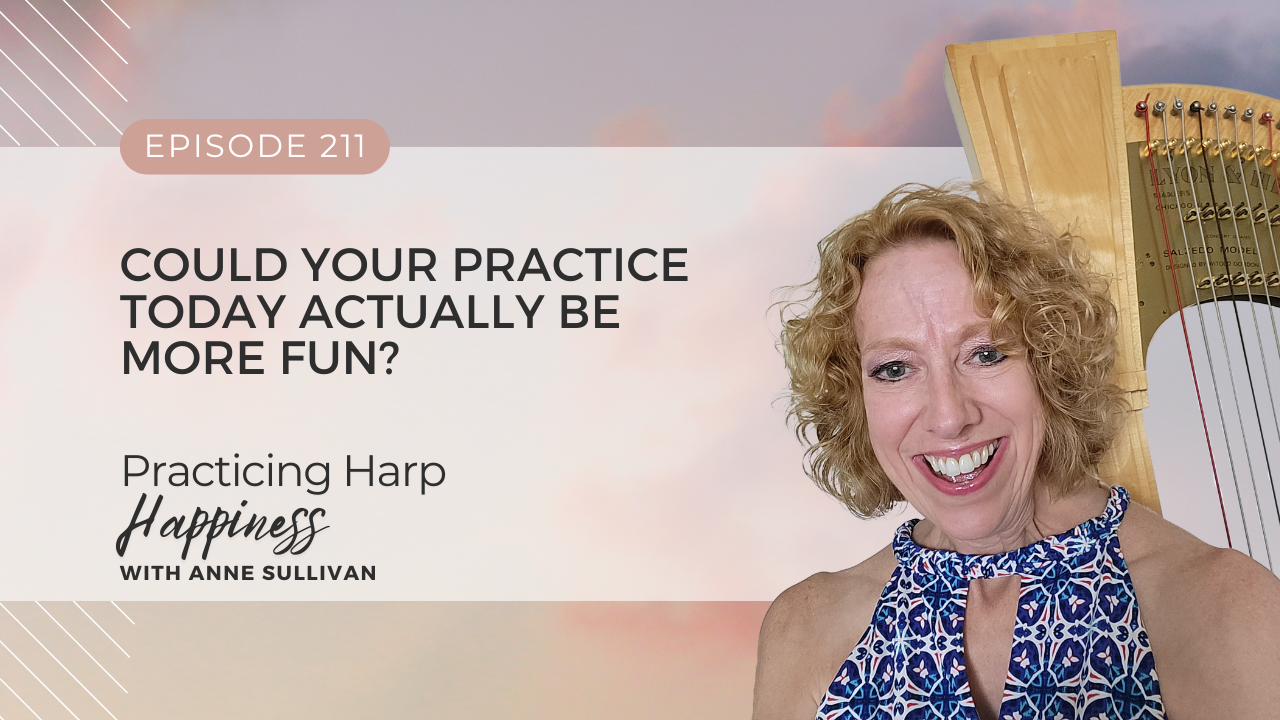
Every time I talk about putting more fun into your practice, I hear feedback like, “I enjoy my practice,” or “I really like doing the challenging work,” or “My favorite part of practice is my exercises and etudes.” All of those harpists are enjoying their practice, and that’s terrific. But that’s not what I mean.
Much of what we do in our practice can accidentally disconnect us from the music we want to make. We identify and correct mistakes. We drill our technique. We repeat passages over and over again. That’s all part of practice, and it is part of what enables us to play well. But there’s so much more that we could be doing in our practice, so much more that is truly aligned with why we are playing the harp.
Here’s an example that may help you understand what I mean. A young person wants to be a doctor because she likes helping people. She goes to medical school where part of her training involves working when she’s physically exhausted. Part of her training also helps her lea...
#210: Do You Hear What I Hear? Listening with Your Ears Open
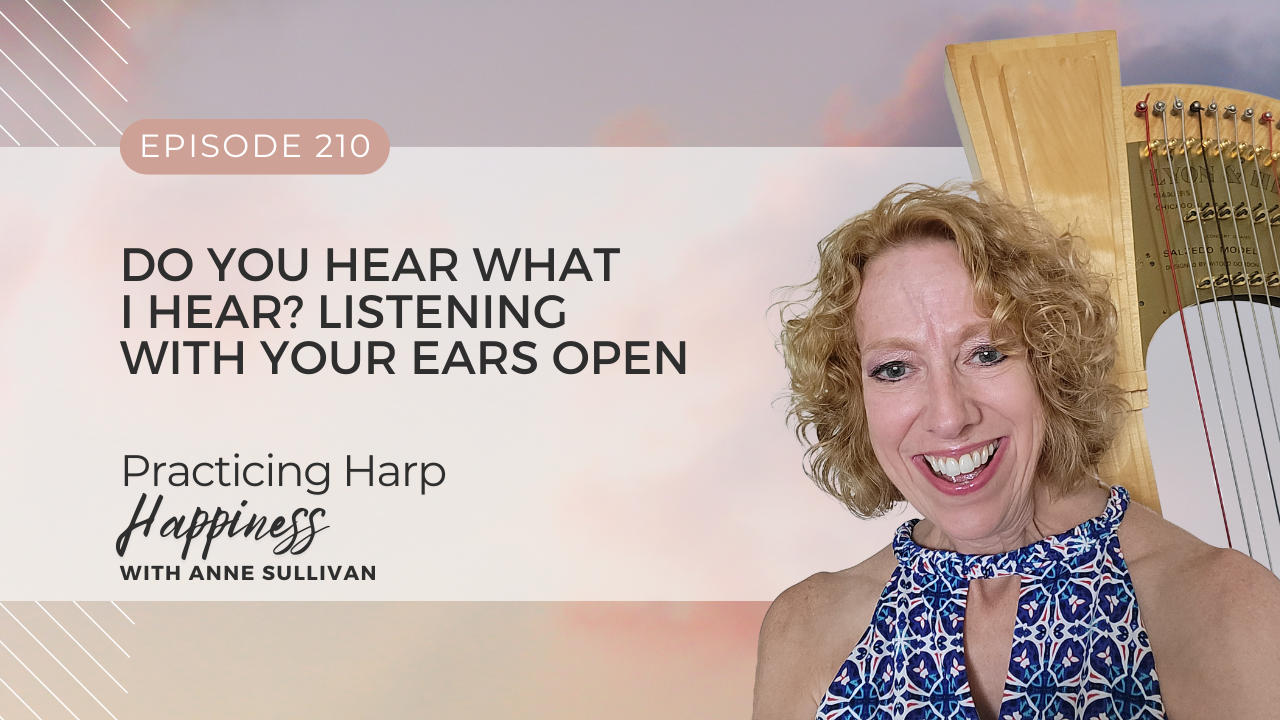
Four friends went to an orchestra concert. Afterward, they went out for dessert and compared notes on the concert, talking about what they heard. Here is what they said:
One person heard the person in the row behind crackling a cough drop wrapper.
One person, a flutist, heard that the clarinet wasn’t in tune with the flute.
One person, a harpist, heard that the orchestra drowned out the harp solo.
One person heard that the piano soloist was humming to himself while he played.
Oddly enough, when the review of the concert appeared in the newspaper the next day, it seemed the critic had gone to a completely different concert. The critic described the pianist as being an impassioned player with a fiery technique, the orchestra as presenting a colorful, well-balanced and nuanced interpretation. There was no mention of out of tune clarinets, or inaudible harps or even noisy cough drop wrappers.
Yes, this is a fictional scenario, although I’ve been part of very similar discussions. I want...

